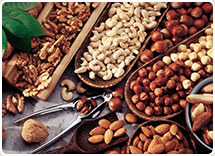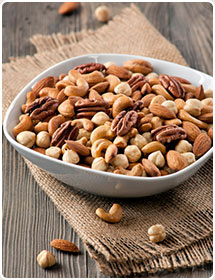Good nutrition
 Peanut and nuts are naturally healthy products. They have a high nutritional value, since they contain many essential nutrients such as vitamins and minerals. They are also well known for their favourable fatty acid content: 80-90% of the fats being ‘good’ unsaturated fats. Unsaturated fat appears to be relevant in relation to the prevention of cardiovascular diseases.
Peanut and nuts are naturally healthy products. They have a high nutritional value, since they contain many essential nutrients such as vitamins and minerals. They are also well known for their favourable fatty acid content: 80-90% of the fats being ‘good’ unsaturated fats. Unsaturated fat appears to be relevant in relation to the prevention of cardiovascular diseases.
 Nuts in your diet
Nuts in your diet
Given the numerous favourable nutrients in peanuts and nuts and their proven health effects, they fit nicely into a balanced diet. Still, it is important to consider the amount of energy they provide. In most countries peanuts and nuts are not considered as an essential food product, but are categorized as a non-essential ingredient or as a snack. Men and women can consume about 300 calories as a snack per day.
Check food labels to understand better what you eat
Eating healthily
Many health problems in the western world are caused by unbalanced diet and an unsuitable lifestyle. Fortunately, with some small changes you can adapt your lifestyle to a much healthier one!
- Eat regularly and enjoy the wide variety of foods available
- Base your meals on vegetables
- Eat fish twice a week
- Be moderate with your intake of saturated fat and sugar
- Balance your salt intake
- Eat at least 2 portions (200 grams) of fruit and vegetables every day
- Drink enough, especially water (1.5 to 2 litres a day) and be moderate in your consumption of alcohol
- Be conscious in choosing a healthy daily snack
- Balance your food intake and your activity to maintain a healthy body weight
- Check food labels to understand better what your are eating
- Take time to enjoy your meals
With some small chances you can easily improve your lifestyle
The five key nutritional elements
Today most foods carry nutritional panels on the packaging. Nutritional values are often specified by manufacturers in five elements; energy, protein, carbohydrates, fats, fibre and sometimes vitamins and minerals. This also applies to peanuts and nuts. In this section we provide a short overview of the nutritional benefits of peanuts and nuts.
Energy
 Peanuts and nuts are a good source of energy. A handful of peanuts or nuts, approximately 25 grams, contains about 160 calories. This is about 8% of the total energy content that men and women should consume daily.
Peanuts and nuts are a good source of energy. A handful of peanuts or nuts, approximately 25 grams, contains about 160 calories. This is about 8% of the total energy content that men and women should consume daily.
Proteins
Peanuts and nuts are a good source of proteins. They contain on average 16 grams of proteins per 100 grams. Because of their protein content, peanuts and nuts are considered to be a healthy substitute for meat. Proteins are an important building block for our body. We need them for the formation of cells, muscles, organs, the nervous system, bones and blood. Proteins also stimulate satiation. This effect is even greater in combination with fibre.
Carbohydrates
Along with fats, the carbohydrates in peanuts and nuts are an important source of energy for the body. Carbohydrates are broken down by the body to form glucose, which ends up in the bloodstream. The glucose is transported to different parts of the body, where it serves as a fuel.
Fats
Peanuts and nuts are an important source of unsaturated fat. On average, 80-90% of the total quantity of fat in nuts and peanuts is unsaturated fat. It is important to our health that we choose products that are high in unsaturated fat. Unsaturated fat can reduce our blood cholesterol level, which helps in preventing the occurrence of cardiovascular disease.
Cholesterol

Most consumers think that peanuts and nuts contain cholesterol. But they do not, since they are a vegetable product. Cholesterol is a fatty substance that our body needs for body cells and hormones. Our body cannot function without cholesterol. Too much, however, is harmful for our body. Most of the cholesterol necessary is produced by our liver. A small portion is absorbed from food, by eating animal products such as dairy products and eggs.
Food fibre
On average, peanuts and nuts contain 5 grams of food fibre per 100 gram. This corresponds to 15% of the recommended amount of fibre an adult needs per day. The fibre content in peanuts and nuts satisfies your hunger. It therefore can play a role in the prevention of overweight.
Vitamins
Peanuts and nuts contain a wide variety of different vitamins. So if you eat peanuts and nuts you provide your body with B vitamins, folic acid and vitamin E. The B vitamins (B1, B2, B3, B6, folic acid) play an important role in providing energy to our body, are important for healthy skin and hair, and help in building healthy cells. Vitamin E is a strong antioxidant. Antioxidants are natural substances that protect our body against so-called ‘free radicals’. They can play a role in preventing cardiovascular disease and cancer and retard the ageing process.
B-vitamins in nuts are important for a healthy skin and hair
Minerals
The minerals in peanuts and nuts are magnesium, phosphorus, iron and zinc. The first two minerals play an important role in the proper functioning of the nervous system and the muscles, and in the formation of bones and teeth. Iron plays an important role in the transport of oxygen through the body. Since animal products are an important source of iron, vegetarians need to substitute their iron intake with other food sources. Peanuts and nuts contain ample amounts of iron, about 3 mg / 100 grams on average. Zinc is an important antioxidant. Antioxidants are natural substances that protect our body against so-called ‘free radicals’. They can play a role in preventing cardiovascular disease and cancer and retard the ageing process.
Sodium
Naturally, peanuts and nuts contain virtually no sodium. Unsalted peanuts and nuts contain around 2 milligrams of sodium per portion (25 grams). Salted peanuts and nuts contain around 0.1 gram of sodium per portion. This is not even 3% of the 2.4 grams of sodium (6 grams of salt) that is now being used as a guideline in several European countries, such as the Netherlands and the UK.
A handful of salted nuts contains 3% of the advised daily salt intake
